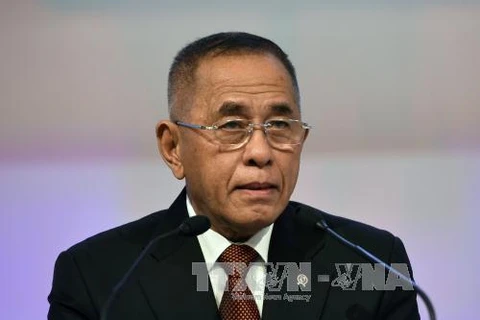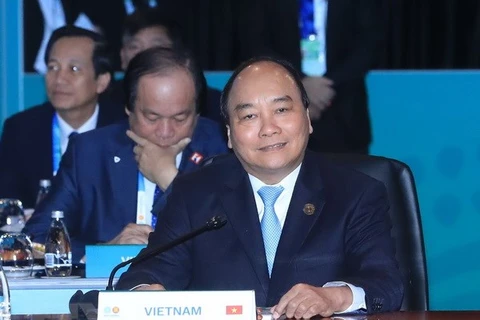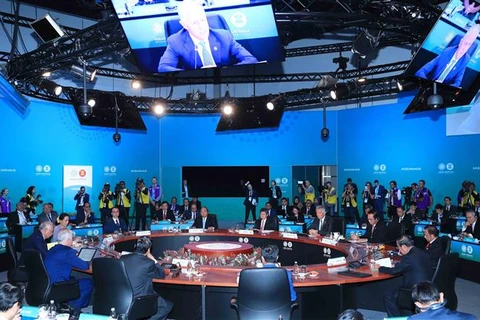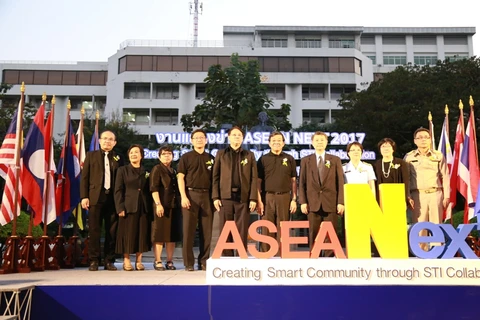Jakarta (VNA) – The 10th Coordinating Conference for the ASEAN Political-Security Community (ASCCO) took place in Indonesia’s capital city of Jakarta on March 22.
The conference brought together delegates from the ten ASEAN member countries, the ASEAN Secretariat and representatives from 14 ASEAN agencies and organisations which are participating in the implementation of the ASEAN Political-Security Community (APSC) Blueprint 2025.
The Vietnamese delegation to the event comprises representatives from the Ministries of Foreign Affairs, National Defence, Public Security and Justice.
The conference reviewed the materialisatioin of the blueprint, and discussed orientations and measures in the time to come.
Cooperation in politics and security within ASEAN has made significant progresses in all spheres in terms of both quality and quantity over the past time, with 239 out of 290 action lines set in the blueprint realised, the conference heard.
The delegates agreed to continue prioritising the enhancement of dialogues and cooperation for peace and stability in the region, the promotion of trust building, and effective settlement of challenges, while contributing to easing tension in a number of hot-spots in the region.
Regarding the East Sea issue, they reiterated reached principles on the significance of peace, stability, security, safety and freedom of navigation and overflight in the East Sea, respecting international law, settling disputes by peaceful means, exercising self-restraint, taking no actions that complicate the disputes, taking non-militarisation, fully and effectively implementing the Declaration on the Conduct of Parties in the East Sea (DOC) and soon completing a Code of Conduct in the East Sea (COC).
They also highlighted the approval of the COC framework and the kick-start of negotiations on the COC between ASEAN and China.
The conference also noted achievements in collaboration in specialised realms of the APSC such as the combat against terrorism and trans-national crimes, national defence, and consular and immigration affairs.
External relations remain a spotlight of ASEAN, the delegates said, adding that apart from existing dialogue partners, the group has established relations with four new partners namely Norway, Switzerland, Turkey and Germany, along with expanding cooperation with many regional organisations.
Up to 90 countries and organisations have dispatched their ambassadors to ASEAN. Besides, 53 ASEAN committees have been set up in countries outside the region and places accommodating headquarters of major international organisations.
The delegates consented that the ASEAN member nations and agencies should double efforts in order to improve the quality of the implementation of the APSC Blueprint 2025, focusing on coordination between agencies, especially in cross-sectoral and inter-pillar matters.
Communications plans should be rolled out to raise public awareness of benefits generated by the ASEAN political-security cooperation, they said.
Outcomes of the conference are expected to be submitted to ASEAN leaders during the upcoming Summit.
The APSC Blueprint 2025 was approved on November 21, 2015. It is envisaged to build upon the achievements that have been made to elevate ASEAN political and security cooperation to an even higher level. This will ensure a rules-based and inclusive community in which people enjoy human rights, fundamental freedoms and social justice, live in a safe and secure environment with enhanced capacity to respond effectively to emerging challenges and in a dynamic region where ASEAN enhances its centrality in the evolving regional architecture and plays a constructive role globally. In this regard, this Blueprint promotes a people-oriented, people-centred ASEAN in which all sectors of society, regardless of gender, race, religion, language, or social and cultural background, are encouraged to participate in, and benefit from, the process of ASEAN integration and community building.
Founded in 2006, the ASCCO aims to create a forum for specialised agencies to share information and experience, and coordinate with each other during the building of the APSC.
Apart from ASCCO, ASEAN established coordination mechanisms for its ASEAN Economic Community and the ASEAN Socio-Cultural Community.
The Association of Southeast Asian Nations (ASEAN) was established on August 8, 1967. The member states of the association are Brunei, Cambodia, Indonesia, Laos, Malaysia, Myanmar, the Philippines, Singapore, Thailand and Vietnam. The ASEAN Secretariat is based in Jakarta, Indonesia.-VNA
VNA
























